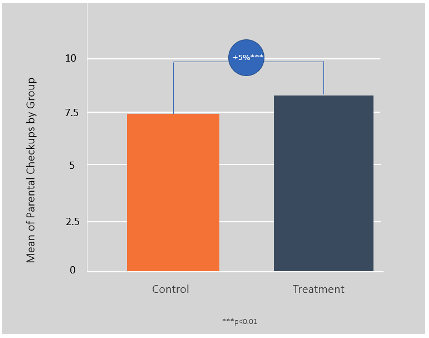SMS Can Increase Awareness About Prenatal Care

Context
Several studies demonstrate that prenatal events can have lifelong consequences fon cognitive and noncognitive development, educational attainment, and labor market productivity (Almond and Currie, 2011; Almond et al., 2018; Prinz et al., 2018). Although the American Medical Association (AMA) indicates that frequent (at least 14) prenatal care visits facilitate an adequate development of the fetus, most pregnant women in developing countries attend at most only one prenatal-care visit during their entire pregnancy.
Increased awareness about the importance of prenatal care is therefore vital, and information and communication technologies such as mobile phone short message services (SMS) could be used to reach expectant mothers. Previous evidence on SMS-based interventions aimed at incentivizing desirable behaviors shows that they have been effective in improving attendance to medical outpatient clinics (Perron et al., 2010) and triggering desirable disease prevention and management practices (Cole-Lewis and Kershaw, 2010; Dammert et al., 2014).
The Project
In 2010, the IDB implemented the WAWARED project (in English, “Connecting for Better Maternal and Child Health in Peru”). WAWARED was implemented in a district of Callao, where 98 percent of the population qualifies for government-paid comprehensive medical insurance (Comprehensive Health Insurance). Nevertheless, prenatal care visits remained well below the AMA recommendation.
The project involved developing and implementing a medical record system for maternal health. This system is connected to a platform that sends personalized SMS to pregnant women. A randomized controlled trial was implemented to assess their effectiveness.
Behavioral Analysis
Behavioral Barriers
Limited attention: The amount of attention at our disposal at any given moment is limited, which is a reason why we tend to overlook important details and forget things. In focus groups conducted during project preparation, most of the women reported that forgetting was one of the main reasons for missing their prenatal checkups.
Hassle factors: Seemingly small inconveniences, such as having to read a lot of information or take an extra small step to complete an action, can hinder or disrupt decision-making processes.
Cognitive overload: The cognitive load is the amount of mental effort and memory used at a given moment in time. ‘Overload’ occurs when the volume of information presented exceeds an individual’s capacity to process it. Thus, the fact that our attention and memory are limited prevents us from processing all available information at the same time. This leads to, for example, forgetting the date of an appointment.
Behavioral Tools
Reminders: They can take many forms, such as an email, a text message, a letter, or an in-person visit reminding individuals of some aspect of their decision-making process. Reminders are designed to mitigate procrastination, oversight, and cognitive overload. Therefore, reminders for scheduled prenatal visits could mitigate attention failures and motivate greater compliance with scheduled appointments.
Prominence: Human beings have limited stores of attention. Making key elements visible and prominent at the proper time and place is as important as the message itself.
Simplification: Reducing the effort required to perform an action. For example, cutting the number of steps involved in achieving a complex goal, or break it down into simpler steps.
Intervention Design
The development of the electronic medical records system and SMS interface was completed in January 2012. The system began full and effective application and functionality in March 2012. Pregnant women attending their first prenatal care visit within the first 20 weeks of gestation were randomly assigned to a treatment or control group. During the pilot period, which ran from March 2012 until January 2013, randomization was conducted weekly via an automatic routine embedded in the electronic system and SMS interface.
The final sample included 1,162 women, of whom 576 received reminders by SMS (treatment) and 586 did not (control). The initial sample showed a dropout rate of 6 percent.
The SMS intervention delivered two sets of messages:
- Prenatal-care visit reminders. Reminders were sent every Monday, and the day before the scheduled appointment. The messages sent on Mondays encouraged women to attend their prenatal visits. The message the day before the appointment was personalized and included the exact day, time, and location of the upcoming appointment. These messages sought to increase compliance with scheduled prenatal visits by ameliorating cognitive overload and limited attention.
- Messages conveying educational information: To increase awareness about good nutritional practices, messages recommended desirable food items, discouraged undesirable food items, and highlighted the importance of taking prenatal vitamins. These messages were sent on Wednesdays and Saturdays. Table 1 summarizes the typology of the text messages sent, along with their frequency by gestation week and some examples. Finally, other specific educational messages concerning maternal conditions—including hyperemesis, obesity, malnutrition, anemia, smoking, hypertension, diabetes, HIV, tuberculosis, and alcohol and drug consumption—were also developed and delivered only to women affected by the specific condition.
Table 1. Typology of Messages

Challenges
- External validity: These findings apply to women with personal cellphone ownership and relatively early prenatal care visits (i.e., before twenty weeks of pregnancy). Out of the 6,100 women who attended their first prenatal visit in one of the sixteen health centers in the study, 956 women were ineligible as they either were under eighteen years old or had attended their first prenatal visit after the first twenty weeks of pregnancy, 640 did not have a personal cellphone, and 193 did not consent to participating in the study.
Results
These results confirm that reminders were effective in ameliorating attentional failure
and forgetfulness:
- Providing SMS increased the likelihood of attending all the prenatal-care checkups by 9 percent.
- As figure 2 shows, below, belonging to the treatment group also increased the number of total prenatal-care checkups by 5 percent with respect to the control group mean (0.36/7.48).
Figure 2. Mean of Parental Checkups by Group

- The positive effect on completed visits is explained mainly by the number of visits actually made on the scheduled date and time (equivalent to 0.24 visits on time or 11 percent with respect to the control group mean).
- Educational messages had some weak impacts in increasing awareness regarding the desirability of specific food items, altering eating habits to some extent. But no significant effects were found for vitamin intake compliance and newborn health.
- Heterogeneous effects were found by educational level and distance from the health center. Larger impacts were seen among more educated women with easier access to health centers.
Policy Implications
- Information and communication technologies can contribute both to lessening attentional failure and increasing awareness toward incentivizing better prenatal care. Because the intervention seems more effective among more educated women, it could be the case that less-educated women might benefit from a more personalized education approach about preventive care during pregnancy.
- Text messages might need to be complemented by other institutional arrangements aimed at disadvantaged groups of women to increase their understanding of the benefits of preventive care.
